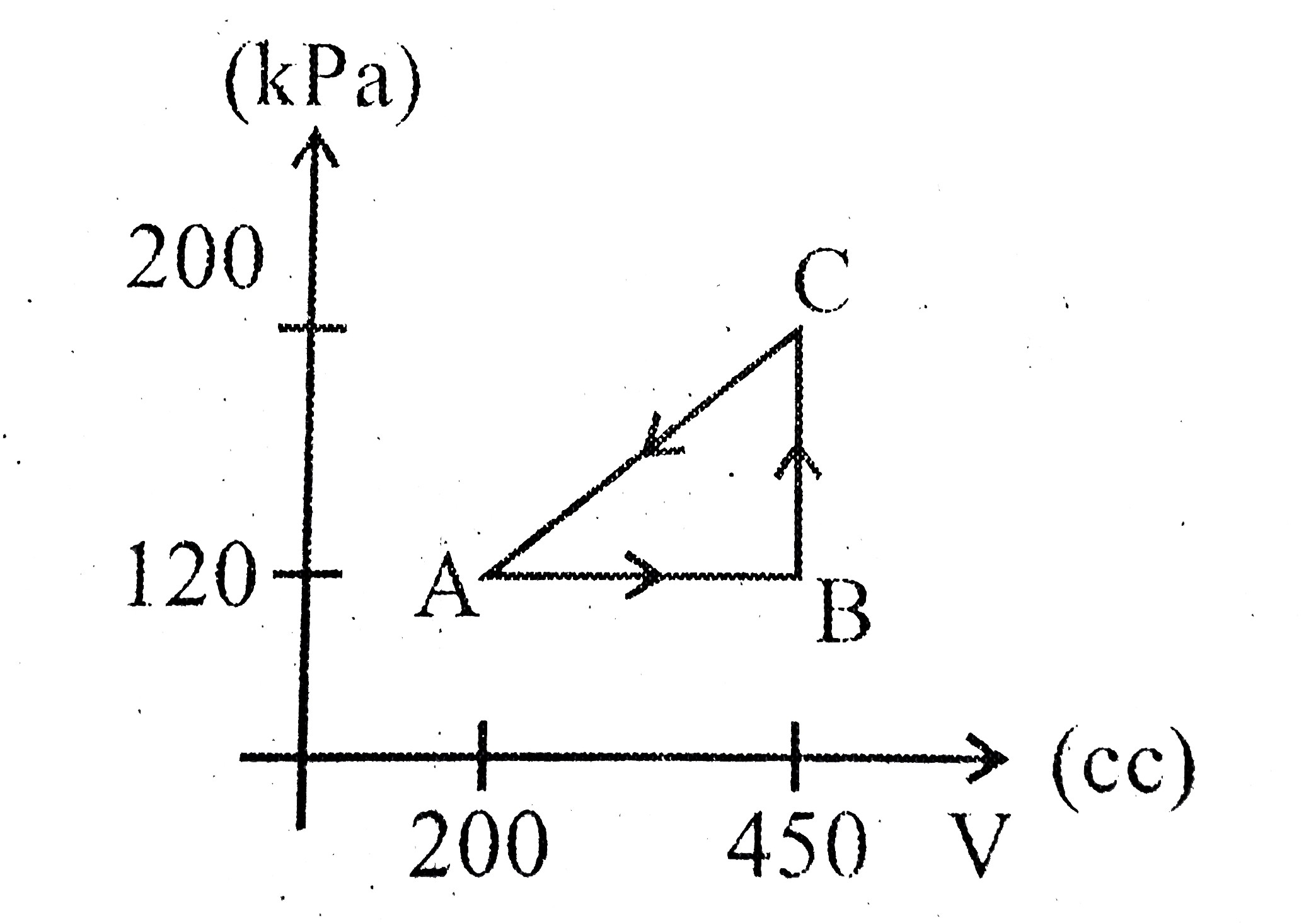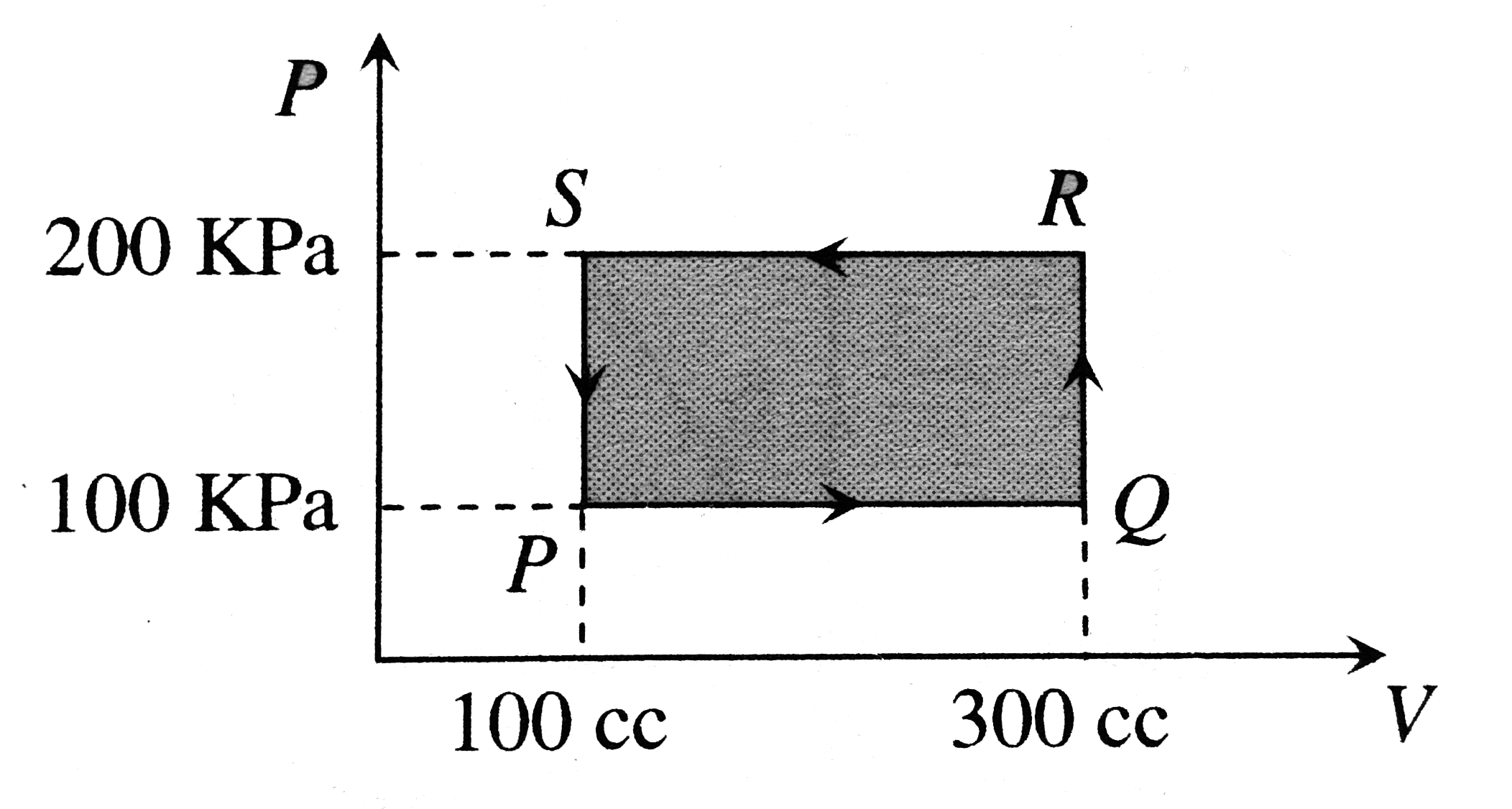In changing the state of a gas adiabatically from an equilibrium state A to another equilibrium state B, an amount of work equal to 22.3 J is done on the system. If the gas is taken from state A to B, via a process in which the net heat absorbed by the system is 9.35 cal, how much is the net work done by the system in the latter case ?
When the gas changes state under adiabatic condition (A→B)
ΔQ=0⇒ΔU=−ΔW−22.3J
Since internal energy of the system is independent of path followed.
∴ In second case, ΔU=−22.3J
ΔQ=9.35cm1=θ.35×4.2)J=39.27J
Topper's Solved these Questions
- GASEOUS STATE & THERMODYNAMICSBOOK - VMC MODULES ENGLISHCHAPTER - GASEOUS STATE & THERMODYNAMICSEXERCISE - Level - 1
75 Videos
- GASEOUS STATE & THERMODYNAMICSBOOK - VMC MODULES ENGLISHCHAPTER - GASEOUS STATE & THERMODYNAMICSEXERCISE - Level - 2
40 Videos
- GASEOUS STATE & THERMODYNAMICSBOOK - VMC MODULES ENGLISHCHAPTER - GASEOUS STATE & THERMODYNAMICSEXERCISE - level-0 Short Answer Type – I
10 Videos
- ENERGY & MOMENTUMBOOK - VMC MODULES ENGLISHCHAPTER - ENERGY & MOMENTUMEXERCISE - JEE ADVANCE (ARCHIVE) - TRUE/FALSE TYPE
1 Videos
- GRAVITATIONBOOK - VMC MODULES ENGLISHCHAPTER - GRAVITATIONEXERCISE - JEE Advance (Archive) TRUE/FALSE
1 Videos
Similar Questions
In changing the state of a gas adiabatically from an equilibrium state A to another equilibrium state B, an amount of work equal to 22.3J is done on the system. If the gas is taken from State A to B via a process in which the net heat absorbed by the system is 9.35cal., How much is the net work done by the system in the later case? (Take 1cal.=4.9J)
View SolutionWhen a system is in equilibrium state
View Solution
Knowledge Check
In changing the state of a gas adiabatically from an equilibrium state A to another equilibrium state B an amount of work equal to 22.3 J is done on the system.If the gas is taken from state A to B via a process in which the net heat absorbed by the system is 9.35 cal then the net work done by the system in latter case is
(Take 1 case =4.2 J)A15 JB16 JC17 JD18 JWhen the state of a gas adiabatically changed from an equilibrium state A to another equilibrium state B an amount of work done on the stystem is 35 J. If the gas is taken from state A to B via process in which the net heat absorbed by the system is 12 cal, then the net work done by the system is (1 cal = 4.19 J)
Aa. 13.2JBb. 15.4 JCc. 12.6 JDd. 16.8 J
Calculate the work done by the gas in the state diagram shown :

View SolutionThe internal enegy of an ideal gas decreases by the same amount as the work done by the system.
View SolutionA thermodynamic system is taken through the cyclic PQRSP process. The net work done by the system is

View SolutionA thermodynamic system is taken through the cyclic PQRSP process. The net work done by the system is

View SolutionFor a gaseous system find change in internal energy if the heat supplied to the system is 50 J and work done by the system is 16 J.
View SolutionFor a gaseous system find change in internal energy if the heat supplied to the system is 50 J and work done by the system is 16 J.
View Solution
